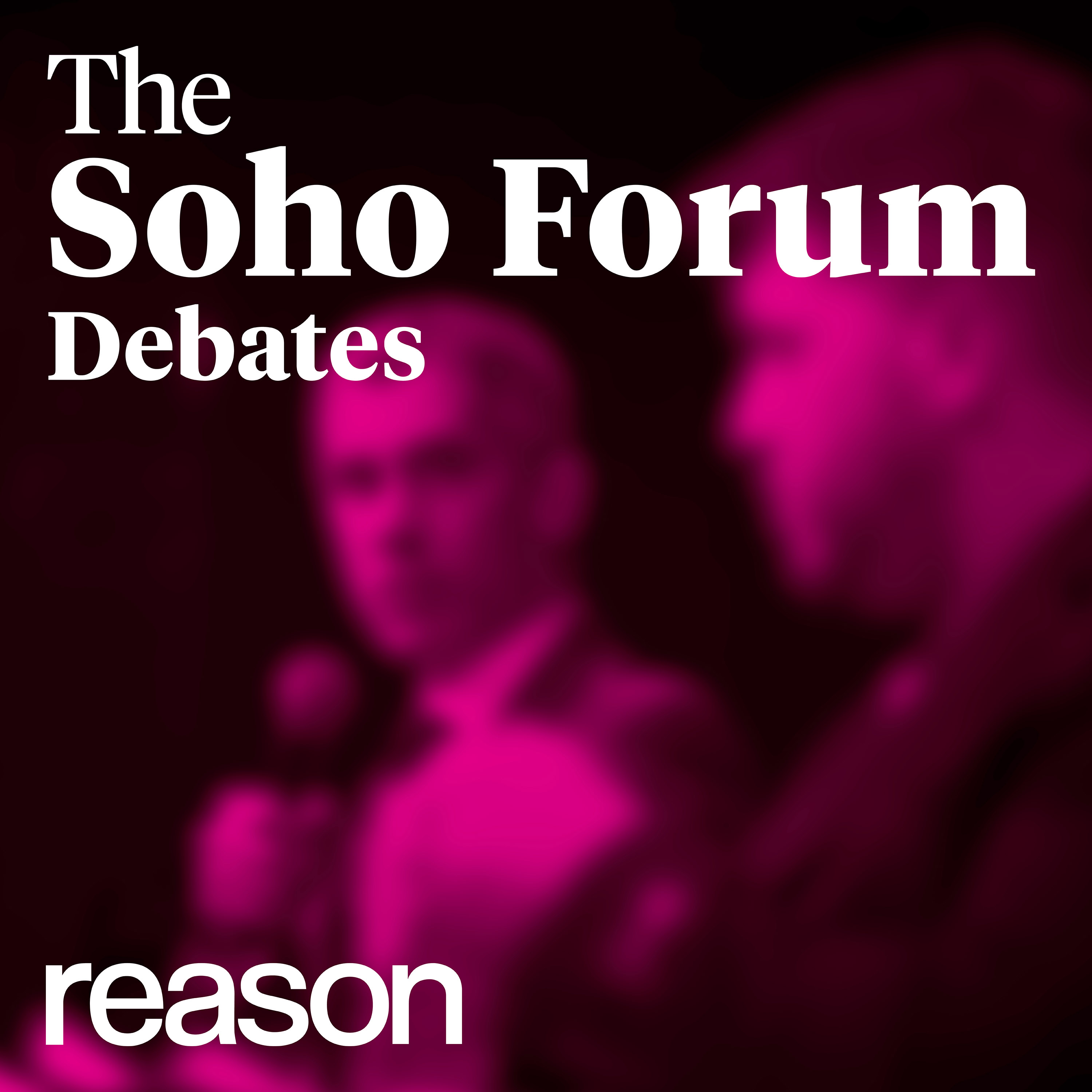

The Soho Forum Debates
The Soho Forum Debates
Reason presents a libertarian-themed debate series recorded monthly before a live audience in New York City. Moderated by former Barron's Economics Editor Gene Epstein, the Soho Forum features Nobel prize winners, radical thinkers, and other public intellectuals facing off over the future of abortion, bitcoin, electric vehicles, government debt, illegal drugs, robotics, sex work, and other controversial topics.
Episodes
Mentioned books

Apr 26, 2024 • 1h 33min
A Soho Forum Discussion of COVID with Tom Woods
Tom Woods engages in a debate on COVID restrictions, emphasizing individual liberties. Analysis includes pandemic economics, government interventions, and public health responses. Critique on COVID policies, mask effectiveness, accountability of key figures, and misinformation. Discussion on data analysis, state disparities, and societal impacts. Promotions for future election debates with notable guests like Alan Dershowitz and Glenn Greenwald.

7 snips
Apr 5, 2024 • 1h 32min
Did Capitalism Fail During the Pandemic?
Joe Nocera and Gene Epstein debate the impact of capitalism during the pandemic, discussing globalization, cronyism in big pharma, and shortages of medical supplies. They explore private equity in nursing homes, profit motives in healthcare, rising income inequality, and the influence of crony capitalism on vaccine development. The debate touches on government-business alliances, economic consequences of lockdowns, and disparities in pandemic responses worldwide.

Mar 1, 2024 • 1h 29min
What's the Root Cause of the Israeli-Palestinian Conflict?
Debate on the root cause of Israeli-Palestinian conflict, exploring historical claims, Jerusalem's significance, and complexities of the conflict. Ancestral connections, legal aspects of apartheid, and upcoming debates on capitalism and COVID-19 are discussed.

Feb 2, 2024 • 1h 30min
Must Government Fund Science?
M. Anthony Mills and Terence Kealey debate government funding for science, exploring its impact on technological advancements. They discuss historical perspectives, the evolution of science from the 18th to the 19th century, federal funding in the US, and the relationship between government funding, economic growth, and research. The debate highlights the role of basic science in driving innovation.

Dec 22, 2023 • 1h 31min
Social Media Censorship and The First Amendment
Law professor Kate Klonick and Dr. Jay Bhattacharya debate government involvement in social media censorship post a federal court ruling. Topics include national internet policy, First Amendment, citizenship reflections, evolution of censorship, government coercion, and platform struggles.

Nov 17, 2023 • 1h 46min
Will AI Destroy Humanity?
Susan Schneider and Jobst Landgrebe debate the threat of AI to humanity. They discuss the evolution of chatbots, the limitations of AI, the relationship between intelligence and consciousness, regulating deep fakes, and the resolution of the debate on AI's threat.

Oct 20, 2023 • 1h 36min
Will Electric Cars Disappoint Environmentalists?
The Manhattan Institute's Mark Mills and InOrbis CEO Rosario Fortugno debate the resolution, "Between now and 2035, electric vehicles in the consumer market will disappoint environmentalists by remaining a product bought mainly by the well-heeled minority."
Taking the affirmative is Mills, a Manhattan Institute senior fellow, a faculty fellow at Northwestern University's engineering school, and a partner in Montrose Lane, an energy-tech venture fund. He is author of the book The Cloud Revolution: How the Convergence of New Technologies Will Unleash the Next Economic Boom and a Roaring 2020s.
Taking the negative is Fortugno, the CEO of InOrbis, a company that works to develop technologies for electric vehicle fleet management, autonomous vehicles, and machine learning. He blogs at ApplyingAI.com on the topics of free markets, electric vehicle adoption, and the benefits of artificial intelligence.
The post Will Electric Cars Disappoint Environmentalists? appeared first on Reason.com.

Sep 22, 2023 • 1h 26min
Would Anarcho-Capitalism Be a Disaster?
Yaron Brook and Bryan Caplan debate whether anarcho-capitalism would be a complete disaster for humanity. They discuss the importance of government in protecting individual freedom, the role of an objective system of law and an impartial arbitrator, the potential for peace and the role of diplomacy, secession as a means to foster competition, and the differences between anarcho-capitalism and minarchism.

Aug 25, 2023 • 1h 27min
Should Libertarians Support School Choice?
Education activist Corey DeAngelis and attorney Stephan Kinsella debate the merits of libertarian support for the school choice movement. They discuss the flaws in the public school system, the benefits of education savings accounts, government regulation on private and homeschooling, potential consequences of educational welfare, building coalitions, and examining charter school admissions.

Jul 28, 2023 • 1h 42min
Should the U.S. Have Free Immigration?
The Cato Institute's Alex Nowrasteh and attorney Francis Menton debate the resolution, "The U.S. should have free immigration except for those who pose a security threat or have a serious contagious disease."
Taking the affirmative is Nowrasteh, the vice president of economic and social policy studies at the Cato Institute, where most of his work has focused on immigration. He's the co-author (with Benjamin Powell) of Wretched Refuse?: The Political Economy of Immigration and Institutions. A native of Southern California, Nowrasteh received a master's degree in economic history from the London School of Economics.
Taking the negative is Menton, who writes at manhattancontrarian.com and was a litigation partner at Willkie Farr & Gallagher LLP before retiring in December 2015 after over 40 years with the firm.
The debate was held at New York City's Sheen Center and hosted by The Soho Forum, which receives fiscal sponsorship from Reason Foundation, the nonprofit that publishes this site.
Audio editing by John Osterhoudt.
The post Should the U.S. Have Free Immigration? appeared first on Reason.com.


